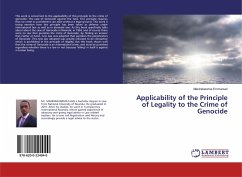This book starts by sketching out the specific historical parameters in which genocide will be examined. It also explores the interrelationship between the mindset of génocidaires and that of bystanders to genocide on the one hand, and, on the other hand, measures adopted in an effort to prevent génocidaires from committing their atrocities. Its chief argument is that a process of abstraction is a key element in the development of genocidal intent and that an evolving attitude of indifference is prevalent among the observers of genocidal crimes. The starting point for considering each of these elements is the legal approach to the crime of genocide and especially its specific intent and efficacy. The book adopts a critical attitude to the legal concept of the crime (especially regarding its restrictions to the 'group element', which refers to the deliberate killing of a large group of people, especially those of a particular nation or ethnic group) and considers the extent to which the current legal analysis of the genocidal mindset contributes to preventing the crime itself.
Bitte wählen Sie Ihr Anliegen aus.
Rechnungen
Retourenschein anfordern
Bestellstatus
Storno








